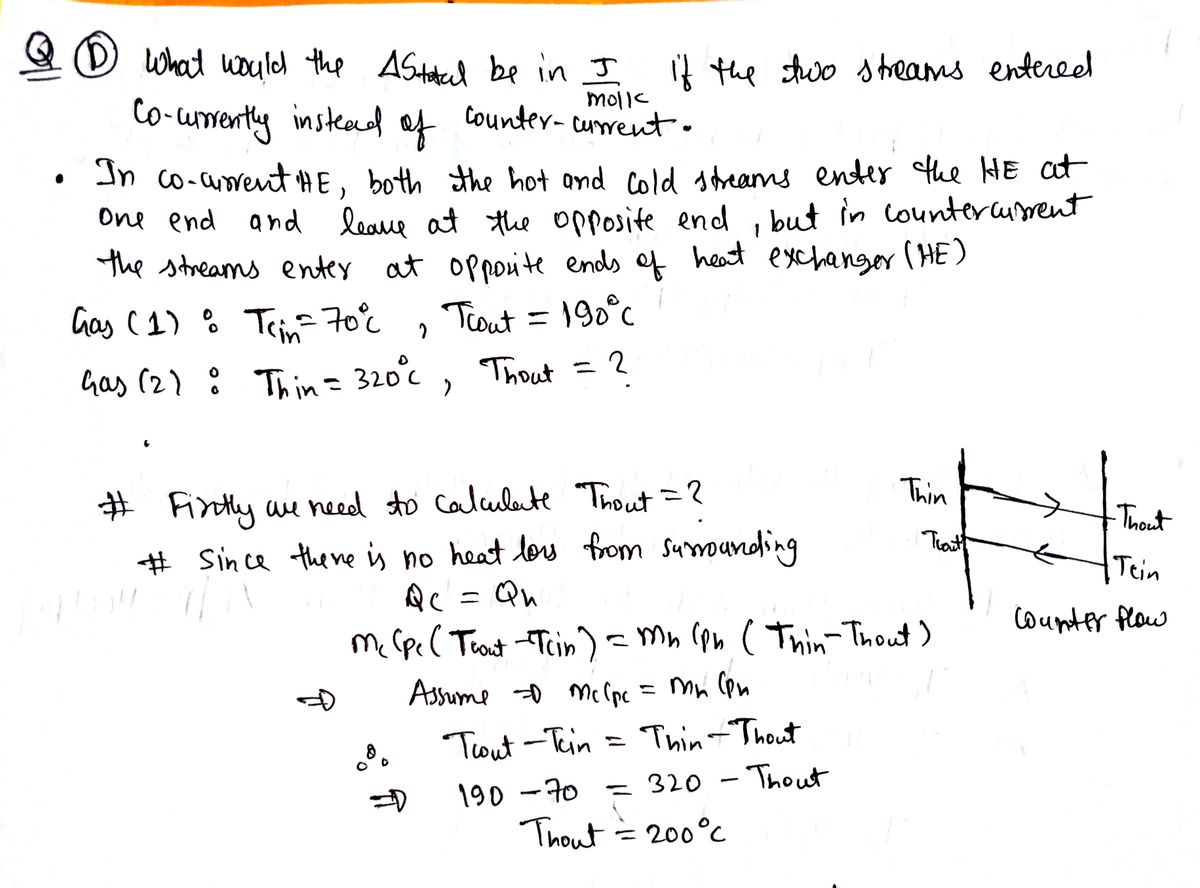What would the AStotal be in counter-current? J mol* K if the two streams entered co-currently instead of
What would the AStotal be in counter-current? J mol* K if the two streams entered co-currently instead of
Introduction to Chemical Engineering Thermodynamics
8th Edition
ISBN:9781259696527
Author:J.M. Smith Termodinamica en ingenieria quimica, Hendrick C Van Ness, Michael Abbott, Mark Swihart
Publisher:J.M. Smith Termodinamica en ingenieria quimica, Hendrick C Van Ness, Michael Abbott, Mark Swihart
Chapter1: Introduction
Section: Chapter Questions
Problem 1.1P
Related questions
Question
D only please
![### Heat Exchanger Entropy Calculation
An ideal gas (Gas 1), with a constant-pressure molar heat capacity \( C_P = \frac{7}{2} R \), is heated counter-currently in a steady-flow heat exchanger from 70°C to 190°C by another stream of the same ideal gas (Gas 2), which enters at 320°C. The flow rates of the two streams are the same, heat losses from the exchanger are negligible, and the inlet and outlet pressures of the gases are the same (i.e., no pressure drop).
#### Problem Statements
1. **Calculate the total molar entropy change \(\frac{J}{mol*K}\) for Gas 1.**
- **Answer:** 8.72
2. **Calculate the total molar entropy change \(\frac{J}{mol*K}\) for Gas 2.**
- **Answer:** -6.57
3. **What is \(\Delta S_{\text{total}}\) in \(\frac{J}{mol*K}\)?**
- **Answer:** 2.15
4. **What would \(\Delta S_{\text{total}}\) be in \(\frac{J}{mol*K}\) if the two streams entered co-currently instead of counter-current?**
- **Answer:** [Blank]
### Explanation
The setup involves a heat exchanger where the gases are flowing in opposite directions (counter-current). To determine the entropy change, we assess each gas separately considering the temperatures they move through. The total entropy change \(\Delta S_{\text{total}}\) is the sum of entropy changes for both gases.
For the calculation where the configuration is co-current (both gases moving in the same direction), the system's overall entropy change is anticipated to be different, affecting the heat transfer efficiency and the total entropy production, which is not provided in the problem statement.](/v2/_next/image?url=https%3A%2F%2Fcontent.bartleby.com%2Fqna-images%2Fquestion%2Fce92dfad-12e8-43a7-81b2-7e9ca428d529%2F86c197ab-f495-44e9-9c26-3f2d9da2a797%2Fk0o2aol_processed.jpeg&w=3840&q=75)
Transcribed Image Text:### Heat Exchanger Entropy Calculation
An ideal gas (Gas 1), with a constant-pressure molar heat capacity \( C_P = \frac{7}{2} R \), is heated counter-currently in a steady-flow heat exchanger from 70°C to 190°C by another stream of the same ideal gas (Gas 2), which enters at 320°C. The flow rates of the two streams are the same, heat losses from the exchanger are negligible, and the inlet and outlet pressures of the gases are the same (i.e., no pressure drop).
#### Problem Statements
1. **Calculate the total molar entropy change \(\frac{J}{mol*K}\) for Gas 1.**
- **Answer:** 8.72
2. **Calculate the total molar entropy change \(\frac{J}{mol*K}\) for Gas 2.**
- **Answer:** -6.57
3. **What is \(\Delta S_{\text{total}}\) in \(\frac{J}{mol*K}\)?**
- **Answer:** 2.15
4. **What would \(\Delta S_{\text{total}}\) be in \(\frac{J}{mol*K}\) if the two streams entered co-currently instead of counter-current?**
- **Answer:** [Blank]
### Explanation
The setup involves a heat exchanger where the gases are flowing in opposite directions (counter-current). To determine the entropy change, we assess each gas separately considering the temperatures they move through. The total entropy change \(\Delta S_{\text{total}}\) is the sum of entropy changes for both gases.
For the calculation where the configuration is co-current (both gases moving in the same direction), the system's overall entropy change is anticipated to be different, affecting the heat transfer efficiency and the total entropy production, which is not provided in the problem statement.
Expert Solution
Step 1

Trending now
This is a popular solution!
Step by step
Solved in 4 steps with 4 images

Recommended textbooks for you

Introduction to Chemical Engineering Thermodynami…
Chemical Engineering
ISBN:
9781259696527
Author:
J.M. Smith Termodinamica en ingenieria quimica, Hendrick C Van Ness, Michael Abbott, Mark Swihart
Publisher:
McGraw-Hill Education

Elementary Principles of Chemical Processes, Bind…
Chemical Engineering
ISBN:
9781118431221
Author:
Richard M. Felder, Ronald W. Rousseau, Lisa G. Bullard
Publisher:
WILEY

Elements of Chemical Reaction Engineering (5th Ed…
Chemical Engineering
ISBN:
9780133887518
Author:
H. Scott Fogler
Publisher:
Prentice Hall

Introduction to Chemical Engineering Thermodynami…
Chemical Engineering
ISBN:
9781259696527
Author:
J.M. Smith Termodinamica en ingenieria quimica, Hendrick C Van Ness, Michael Abbott, Mark Swihart
Publisher:
McGraw-Hill Education

Elementary Principles of Chemical Processes, Bind…
Chemical Engineering
ISBN:
9781118431221
Author:
Richard M. Felder, Ronald W. Rousseau, Lisa G. Bullard
Publisher:
WILEY

Elements of Chemical Reaction Engineering (5th Ed…
Chemical Engineering
ISBN:
9780133887518
Author:
H. Scott Fogler
Publisher:
Prentice Hall


Industrial Plastics: Theory and Applications
Chemical Engineering
ISBN:
9781285061238
Author:
Lokensgard, Erik
Publisher:
Delmar Cengage Learning

Unit Operations of Chemical Engineering
Chemical Engineering
ISBN:
9780072848236
Author:
Warren McCabe, Julian C. Smith, Peter Harriott
Publisher:
McGraw-Hill Companies, The